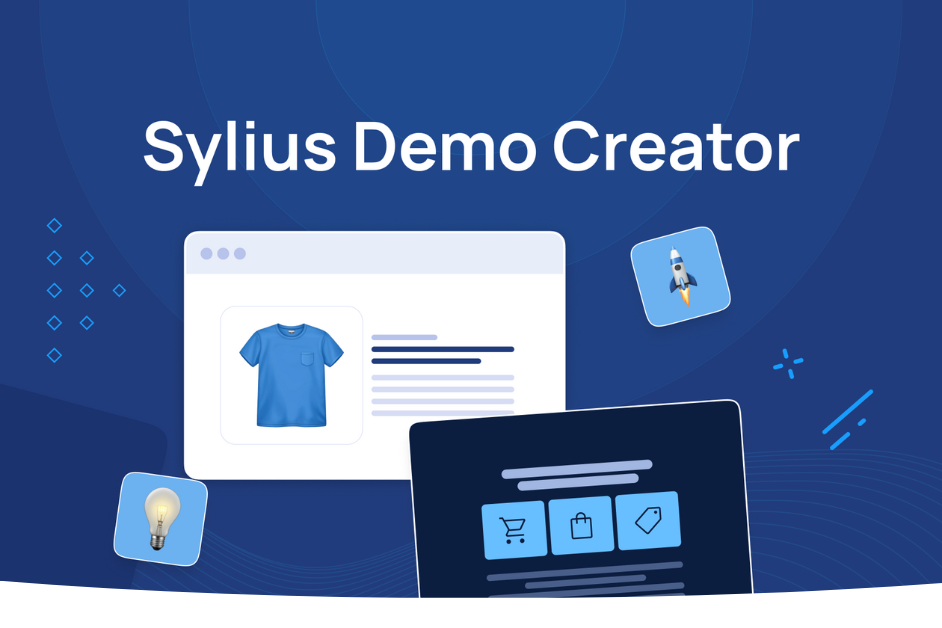When agencies start cooperating with the clients, presenting Sylius as a viable alternative to more mainstream platforms like Magento or Shopware can be challenging. The stakes are high – clients need to visualize their future store, understand what problems Sylius can solve, and see how their specific requirements translate into a working solution.
Usually, creating reliable proof-of-concept demonstrations required agencies to invest 100–200 hours building custom demos. This substantial time commitment came with significant risk – there was no guarantee the client would move forward with the project. The math simply didn't work: dedicating weeks of development time to uncertain prospects wasn't sustainable for most agencies.
The challenge wasn’t Sylius, but imagination
The fundamental issue wasn't Sylius's capabilities – the platform is robust and flexible. The problem was the mentioned demonstration. Clients needed to see their logo, their products, and their brand colors integrated into a functional store. They wanted to understand how their specific catalog would look, how their checkout process would flow, and how their unique business requirements would be addressed.
Building these customized demonstrations from scratch meant starting with a blank Sylius installation and manually configuring everything: the theme, the product catalog, the extensions, and the hosting environment. Even for experienced developers, this process consumed enormous amounts of time that couldn't be billed until the project was confirmed.
Building the Demo Creator
Recognizing this pain point, Sylius Team developed Demo Creator – a tool designed to simplify the entire demo creation process. The concept is straightforward – agencies should be able to quickly generate functional eCommerce demonstrations that accurately represent what the final client store could look like.
Demo Creator addresses four core requirements that every client demonstration needs: configuring what data appears in the store, determining how it should look visually, selecting which extensions to install, and deploying everything to an accessible server. While this sounds simple in theory, the implementation required significant development effort from the Sylius team.
<div class="rtb-text-box is-blue-100"👉 Sylius Store: Demo Creator by Sylius</div>
Integrating with AI
The magic happens through AI integration. Now, users can input their specific requirements, including logos, color schemes, product catalogs, and various presets. The AI then takes this information to build a functional online store that clients can browse through with a simple link.
The AI integration changes how these demos come together. Using the OpenAI API, users can describe what they want in natural language rather than wrestling with configuration screens. Agencies can tell the system "we need a fashion store with a minimalist aesthetic" and watch it interpret those requirements automatically.
The AI handles two main tasks – translating descriptions into working store configurations and generating custom visuals. This means even the most specific brand requirements can quickly become functional demonstrations that clients can actually use.
https://bitbag.io/blog/tasks-you-should-never-hand-over-to-machines
https://bitbag.io/blog/how-does-ai-speed-up-web-development
Cloud hosting and accessibility
Demo Creator integrates with Platform.sh for cloud hosting, ensuring that generated stores are accessible online. Agencies don't need to worry about server setup or deployment scripts – the system handles everything automatically and provides shareable links that clients can visit right away. The setup stays flexible, though. Agencies plug in their own API keys and accounts, so they keep control over their demonstrations while still getting the speed benefits.
Worth mentioning is that the Demo Creator also supports manually created presets. This hybrid approach recognizes that some demos benefit from human expertise and industry-specific knowledge that AI might miss.
These presets can be shared openly, creating a community-driven catalog of store templates. If an agency needs to demonstrate an air conditioning remote control store, they might find that someone has already created a preset for electronics retail that can be adapted quickly. The GitHub-based sharing model encourages community contribution and ensures that the ecosystem of available presets grows organically based on real-world project requirements.
{{cta-technology-sylius="/comp/cta"}}
Looking into the future
While Demo Creator currently focuses on B2C implementations, the B2B and marketplace versions will be taken care of in future releases. The tool is still in early development stages, but the core functionality already delivers visible time savings for agencies working on new project prototypes.
Check out the official documentation to get started with Demo Creator, or contribute your own store templates to the community repository to help other agencies build better demonstrations faster.
The future of eCommerce projects doesn't have to involve weeks of speculative development work. With Demo Creator, agencies can focus on what matters most: understanding client needs and delivering demos that close deals faster.
<div class="rtb-text-box is-blue-50">Are you looking for a Sylius experts? Contact us and get a free consultation</div>
See what else Sylius has to offer
https://bitbag.io/blog/sylius-products-b2b-suite
https://bitbag.io/blog/sylius-product-test-application
https://bitbag.io/blog/sylius-product-mcp-commerce
https://bitbag.io/blog/sylius-product-documentation-driven-development
https://bitbag.io/blog/how-sylius-built-frontwing



